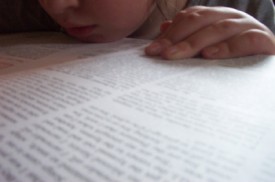 It’s not exactly news that there’s a relationship between auditory processing skills and reading disorders in children. But with research by scientists such as Elise Temple and Nadine Gaab helping to establish and confirm the connection, the mounting evidence points to just how strong the correlation is—especially for children with dyslexia.
It’s not exactly news that there’s a relationship between auditory processing skills and reading disorders in children. But with research by scientists such as Elise Temple and Nadine Gaab helping to establish and confirm the connection, the mounting evidence points to just how strong the correlation is—especially for children with dyslexia.
In a recent study by Jane Hornickel and Nina Kraus published in the Journal of Neuroscience, the authors set out to determine whether inconsistency in the brain’s response to speech sounds is correlated with poor reading skills. The study evaluated 100 normal-hearing children from 6 to 12 years of age who were divided into 3 groups—good readers, average readers, and poor readers—based on their fluency scores.
The researchers asked the children to listen to the syllables “ba” and “ga” while measuring the children’s auditory brainstem response. They also measured the children’s brainstem response to a simple clicking sound for comparison.
The authors found that the auditory brainstem response was considerably more variable for poor readers than for good readers, but only when listening to the relatively complex speech sounds—not when listening to the simple click sound. They also found that the inconsistencies in brainstem response were more closely associated with the consonant portion of the syllable than the vowel portion.
The variability in brainstem response occurred intermittently throughout the testing rather than building over time, and was primarily seen among the poor readers rather than all three groups, indicating that neural fatigue was likely not a factor. The authors note that the more likely explanation for the intermittent variability is poor encoding of speech sounds in the brains of the struggling readers.
According to Kraus, it’s this inconsistency of brain response that prevents some children from making the crucial connection of sound to meaning that is the foundation of language and reading skills. Strong readers, on the other hand, typically make the connection with ease. The relationship between reading ability and auditory processing skills, she says, is “a highly significant relationship.”
Distinguishing between consonants can be particularly difficult for children with dyslexia, as this study shows, because they are spoken so much more rapidly than vowels. But consonants typically give meaning to words (think “cat” vs. “bat”), so that missing bit of information can make learning to read enormously difficult. The takeaway is that when children with normal hearing experience reading difficulty, auditory processing plays a role.
Fortunately, our students’ brains are highly adaptable and responsive, enabling dramatic improvements with appropriate intervention. When the auditory processing issues are corrected, children are then able to make the critical sound-to-meaning connections that lead to proficient reading and improved learning all around.
Related reading:
Dyslexia, Auditory Processing Disorder, and the Road to College: Maria’s Story
What Educators May Not Know about the Neuroscience of Learning

